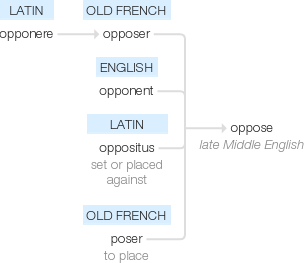Oppose
late Middle English: from Old French opposer, from Latin opponere (see opponent), but influenced by Latin oppositus ‘set or placed against’ and Old French poser ‘to place’.
wiktionary
From Middle English opposen, from Old French opposer, from Latin ob(“before, against”) + Medieval Latin pausare(“to put”), taking the place of Latin opponere(“to oppose”).
etymonline
oppose (v.)
late 14c., opposen, "to speak or act against; accuse, question, interrogate," from Old French oposer "oppose, resist, rival; contradict, state opposing point of view" (12c.), apparently from assimilated form of Latin ob- "in the direction of, in front of" (see ob-) + French poser "to place, lay down" (see pose (v.1)), with the sense blended with that of Latin opponere "oppose, object to, set against" (see opponent). The meaning "to set or place over against or directly opposite" (transitive) and "interpose effort or objection, be adverse, act adversely" (intransitive) are from 1590s. Related: Opposed; opposing.
